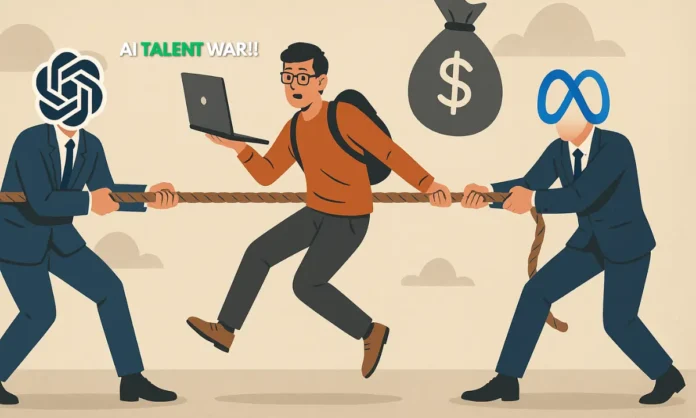Summary
- OpenAI CEO Sam Altman claims Meta has offered signing bonuses of up to $100 million to recruit top OpenAI engineers.
- The tech talent battle intensifies as Meta builds its superintelligence team, recently hiring Scale AI CEO Alexandr Wang.
- Meta, once dominant in open-source AI, is now racing to catch up after key staff exits and stalled model launches.
The Price of Superintelligence: Why Meta Is Going All In
The latest salvo in Silicon Valley’s escalating AI war has taken a personal turn. On a podcast with his brother, OpenAI CEO Sam Altman revealed that Meta is aggressively courting his top engineers—offering signing bonuses reportedly in the realm of $100 million. While such eye-watering figures are typically reserved for top-tier athletes or hedge fund royalty, they’re now part of a surreal new normal in the battle for artificial intelligence dominance.
This comes mere days after Meta announced a $14.3 billion investment in Scale AI and appointed its CEO, Alexandr Wang, to head its newly formed superintelligence team—a not-so-subtle nod to OpenAI’s own ambitions. The subtext? Meta is no longer content being a backseat observer in the AGI (artificial general intelligence) race. But with OpenAI talent allegedly staying put for now, the deeper question looms: Is money enough to buy the minds that might build humanity’s future?
Meta is offering $100M signing bonuses to poach OpenAI talent.
— Tom van den Heuvel (@tomongrowth) June 19, 2025
Sam Altman isn’t flinching.
🧵👇 pic.twitter.com/0XleU3O1wp
Meta’s Billion-Dollar Catch-Up Game
- Meta is investing heavily to bridge the AI innovation gap, including a $14.3 billion deal with Scale AI.
- Alexandr Wang has been hired to lead Meta’s “superintelligence” initiative.
- Staff exits and delays in launching next-gen LLaMA models have set Meta back in the AI race.
- CEO Sam Altman revealed Meta views OpenAI as its “biggest competitor.”
After enjoying early acclaim for open-source models like LLaMA, Meta has found itself lagging behind newer AI frontrunners. OpenAI’s GPT-4o, Google’s Gemini 2.5, and China’s DeepSeek-V2 are all redefining what generative AI can do. While Meta initially gained goodwill by keeping its models open-source, that momentum has fizzled amid key personnel losses and internal shakeups.
In response, Meta’s CEO Mark Zuckerberg appears to be shifting into overdrive. Beyond the Wang recruitment and financial backing of Scale AI, the company is reshaping its core AI strategy with one focus: leapfrogging competitors in general-purpose superintelligence. The decision to directly raid OpenAI’s talent pool signals not only Meta’s urgency but its belief that technical expertise—not brand equity—is the real capital in today’s AI economy.
OpenAI’s Talent Shield: Loyalty, Culture, or the Right Mission?
- Altman claims none of OpenAI’s “best people” have accepted Meta’s offers so far.
- The loyalty may stem from OpenAI’s core mission and tightly-knit internal culture.
- Compensation at OpenAI, though less public, is reportedly generous with equity upside.
- The move exposes increasing vulnerabilities in AI firms’ talent retention strategies.
Altman’s confident tone in stating “none of our best people have taken them up on that” raises eyebrows—and questions. Is this simply a victory lap in a week full of headlines? Or does it speak to a deeper strength at OpenAI: a culture built not just around compensation, but conviction?
OpenAI operates on a quasi-nonprofit charter that enshrines AI safety, alignment, and long-term benefit to humanity. For engineers at the bleeding edge of artificial general intelligence, that mission may hold more appeal than a $100 million check—at least for now. However, as the race heats up and pressure mounts to deliver AGI breakthroughs, it’s unclear how long such loyalty can withstand the gravitational pull of Silicon Valley’s swelling paychecks.
What This Means for the Future of AI?
The story unfolding between Meta and OpenAI isn’t just corporate drama—it’s a blueprint for how the AI era is being built. As companies with trillion-dollar market caps treat AI researchers like elite athletes or geopolitical assets, the lines between innovation, capital, and ideology are blurring.
What we’re seeing is a tectonic shift: the commodification of intelligence at a scale the world has never witnessed. Meta’s open-wallet approach might yield talent, but it could just as easily reinforce the growing gap between AI haves and have-nots. Meanwhile, OpenAI’s current immunity to poaching might only last as long as its lead in capability.
At stake is not just who builds the next model—but who shapes the values, governance, and guardrails of AI itself.


